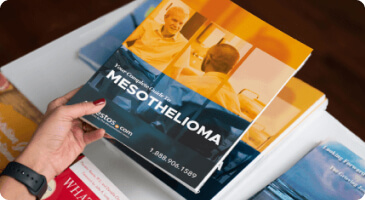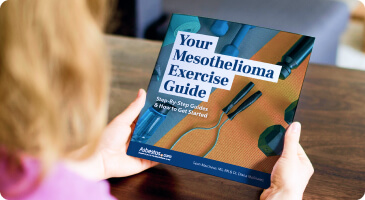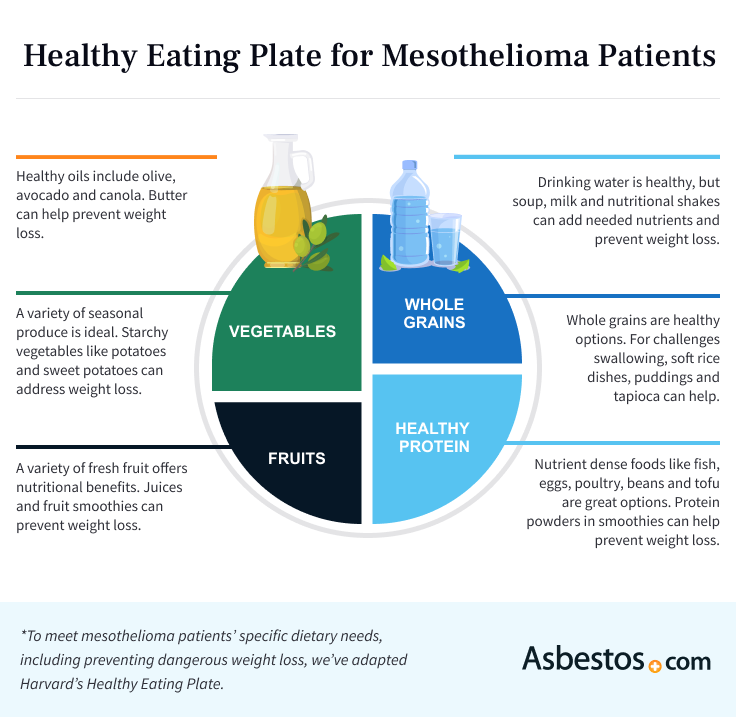

Diets for mesothelioma patients should avoid alcohol, processed meat, red meat and saturated fats. Mesothelioma patients should include more lean proteins in their diet such as poultry, fish, eggs, beans or peanut butter, incorporating them into each meal as possible.
Written by Michelle Whitmer | Medically Reviewed By Diana Zuckerman, Ph.D. | Edited By Walter Pacheco | Last Update: November 5, 2024
Diet and nutrition can help strengthen the immune system to fight mesothelioma and infections. Certain foods can also help counter some of the effects of cancer. Consuming more proteins, for example, may help boost the immune system and restore tissue mesothelioma damages.
Nutrition also helps maintain energy levels. Consuming the right foods can give you the power to carry out daily activities. Before dietary changes are made, all patients should consult with their mesothelioma doctor.
Not only does what you eat matter when managing mesothelioma, but when you eat can also make a difference. Eating smaller portions throughout the day can help you get the nutrients you need without feeling too full or overwhelmed. If you’re not eating every 3 hours, set a timer. It’s easy to forget to eat when you’re not feeling well.


A healthy, balanced diet can help patients respond better to treatment and reduce its side effects. For example, omega-3 fatty acids in fish oil may help reduce inflammation and improve heart health. This effect can benefit patients with a higher risk for heart problems.
Mesothelioma patients should consume a balanced diet rich in protein, vitamins and minerals. Survivors may also be directed to limit whole grains or avoid other types of food during and while recovering from treatment.
A common diet concern for people with mesothelioma is eating too few calories, which are essential to aid recovery, support immunity and fight fatigue. It’s important to keep your energy levels up and give your body the nutrients it needs to heal.
Mesothelioma treatment can affect your ability to eat as you usually do. Alterations to your diet and eating habits can help you cope with treatment and its side effects. Taking proactive measures to meet nutritional needs for each type of treatment can help.
Some aspects of treatment may affect how you get nutrition. For example, abdominal surgeries can complicate eating and digestion. Some peritoneal mesothelioma patients may receive nutrition intravenously shortly after abdominal surgery.

More than 95% of my mesothelioma patients talk to me about losing weight. We get nutrition involved before we start our multimodality treatment program. We assess how much protein and how many calories they need. To get treatment, you have to have some type of nutrition program involved.
Some foods contain nutrients that may support recovery after mesothelioma treatment. Speak with your doctor about which foods or nutrients they recommend you add to your current diet.
While antioxidants are generally considered part of a healthy diet, they neutralize free radicals. Many chemotherapy drugs use free radicals to attack cancer cells. Chemotherapy patients may be advised to avoid foods high in antioxidants. Speak to your doctor about possible interactions.
Patients may want to avoid certain foods or nutrients that could worsen side effects or weaken the immune system. Foods that are difficult to digest can exacerbate mesothelioma-related or treatment-related digestive problems.
Some foods, such as grapefruits, can negatively interact with chemotherapy and other mesothelioma drugs. Your doctor will tell you about specific foods that may interact with your medications.
Before taking any dietary supplements, it’s important to note that nutritional and herbal supplements usually are less well-researched than mainstream medications. This makes it even harder to predict what problems they may cause when combined with chemotherapy.
Discuss any supplements you’re considering with your mesothelioma care team before taking them. They can provide guidance on which supplements are safe to take. They’ll also tell you which ones to avoid during mesothelioma treatment.
Dietary supplements can interact with cancer drugs. These interactions may make them less effective or cause harmful side effects. High levels of vitamin C or E can interfere with radiotherapy. St. John’s wort, ginseng and garlic supplements may also interfere with chemo drugs.
Even traditional supplements doctors may recommend can have harmful interactions with mesothelioma therapy. Mesothelioma patients on chemotherapy are often prescribed folic acid and B12 supplements to reduce toxic side effects but, vitamin B6 supplements can interact negatively with cisplatin.

Eating the right diet throughout mesothelioma treatment can ease your symptoms.
Get Free Recipes and TipsMeal planning can alleviate the stress associated with food shopping. Meal prepping will also make crafting and following your mesothelioma diet easier.
As a caregiver, stock up on the patient’s favorite foods when food shopping. Buy items essential for meeting their nutritional needs. This can reduce the need to shop often.
The U.S. Department of Agriculture retired the Food Guide Pyramid years ago and replaced it with My Plate. However, My Plate isn’t designed to give people with cancer information about their specific nutrition needs before, during and after treatment.
The Harvard School of Public Health created the Healthy Eating Plate. It’s a better starting place for designing a healthy diet for people with mesothelioma.
The effects of cancer and treatment can make it challenging to eat. Mesothelioma patients also have specific nutritional needs. You’ll need to adjust the Healthy Eating Plate guidelines during cancer therapy to find the best mesothelioma diet for you.

Replace green vegetables, salads and other lower-calorie foods with starchy vegetables such as potatoes and sweet potatoes. For most mesothelioma patients, it’s helpful to increase the protein portion of the plate and decrease whole grains a bit. Sometimes, you may need to add a high-protein, high-calorie liquid nutrition supplement.
Eating enough and getting proper nutrition can be challenging if you have mesothelioma. Patients may have difficulty eating and require additional nutrients to maintain their weight and strength.
If you don’t own a juicer, you can create a juice with a blender and cheesecloth. Blend fruit or vegetables with filtered water, then strain with a cheesecloth available at most grocery stores.
Try to create a joyful or relaxing setting, enjoying food with friends or family. This may reduce stress around eating and lead to more enjoyment while consuming the foods you need.
Mesothelioma patients may struggle to maintain their muscle mass and strength. Eating protein-rich foods regularly is an important part of keeping muscle and fighting fatigue.
Protein examples include chicken, fish, lean beef and pork, Greek yogurt, beans, nuts, spinach, cheese, eggs and soy foods such as tofu or tempeh. Try to eat more of these foods if you’ve lost weight or strength.
Snacks between meals can include protein like cheese, nut butter, roasted nuts or sliced meats. Desserts made with eggs such as cheesecake, custard and pudding can increase protein consumption.
Mesothelioma patients often struggle with maintaining a healthy weight as a result of treatment-related side effects. Adding extra calories to meals can be challenging, but patients must get the necessary nutrients to help their bodies fight cancer.
These tips may help those who are losing weight to maintain their current weight. Maintaining weight and muscle mass is important for those undergoing cancer treatment. It helps the body handle the aggressive nature of anticancer therapies.
Prepare meals in advance and freeze them into meal-sized portions that are easy to heat. Talk with a dietitian if you want assistance planning your meals or preparing a grocery list.
For people undergoing mesothelioma treatment, food safety is crucial. The U.S. Department of Health and Human Services outlines four critical steps to ensure food safety: clean, separate, cook and chill.
Cancer therapies like radiation and chemotherapy often weaken the immune system. A weakened immune system may not correctly fight bacteria, parasites or other potentially dangerous organisms in food.
Foodborne illnesses or “food poisoning” can cause serious adverse effects. Mesothelioma patients should avoid raw or undercooked meat, poultry, seafood and eggs to avoid feeling sick from food. Unpasteurized or raw milk and cheeses should also be avoided.
Food Poisoning Side Effects
Paying attention to reports of food recalls and food-related disease outbreaks can also help prevent health complications. Avoid any contact with or consumption of suspected foods.
For example, the U.S. Department of Agriculture’s Food Safety and Inspection Service issued a public health alert in December 2022 for ground beef that tested positive for E. coli. That same month, the Kraft Heinz Company recalled approximately 2,400 pounds of ready-to-eat ham and cheese loaf because of possible cross-contamination with under-processed products.
Mesothelioma doctors recommend that cancer patients eat foods rich in nutrients such as eggs, fruit and salmon. Also, patients should have a diet high in protein with starchy vegetables and plenty of water to counter the effects of mesothelioma treatment.
A registered dietitian can assess your nutritional needs and help develop a personalized nutrition plan. They’ll base a program on your needs, preferences and health status, including mesothelioma. A registered dietitian can also help you navigate any dietary restrictions or challenges that may arise during your treatment.
Yes, some foods may interact with chemotherapy drugs, which can impact their effectiveness or cause side effects. Supplements may also interfere with cancer treatments. A registered dietitian can guide you on potential interactions. Discuss any supplements or dietary changes with your health care team.
While no mesothelioma cure exists, a healthy diet can offset the adverse effects of cancer therapy and improve the treatment outcome. Eating the right foods can make treatment recovery more manageable and improve prognosis.
A healthy diet and exercise are essential for lowering mesothelioma risks and other cancers. A healthy eating pattern will control your weight through various fruits, vegetables, fiber sources and low-calorie foods. Limiting your intake of red meats, sugar-sweetened beverages and highly processed foods will also lower your risk of cancer.
Unexplained weight loss is one of the signs of advanced mesothelioma. Weight loss can also be due to a lack of appetite or persistent nausea, which are symptoms of peritoneal mesothelioma.
This Page Contains 14 Cited Articles
The sources on all content featured in The Mesothelioma Center at Asbestos.com include medical and scientific studies, peer-reviewed studies and other research documents from reputable organizations.
Your web browser is no longer supported by Microsoft. Update your browser for more security, speed and compatibility.
If you are looking for mesothelioma support, please contact our Patient Advocates at (855) 404-4592
The Mesothelioma Center at Asbestos.com has provided patients and their loved ones the most updated and reliable information on mesothelioma and asbestos exposure since 2006.
Our team of Patient Advocates includes a medical doctor, a registered nurse, health services administrators, veterans, VA-accredited Claims Agents, an oncology patient navigator and hospice care expert. Their combined expertise means we help any mesothelioma patient or loved one through every step of their cancer journey.
More than 30 contributors, including mesothelioma doctors, survivors, health care professionals and other experts, have peer-reviewed our website and written unique research-driven articles to ensure you get the highest-quality medical and health information.
My family has only the highest compliment for the assistance and support that we received from The Mesothelioma Center. This is a staff of compassionate and knowledgeable individuals who respect what your family is experiencing and who go the extra mile to make an unfortunate diagnosis less stressful. Information and assistance were provided by The Mesothelioma Center at no cost to our family.LashawnMesothelioma patient’s daughter


Parekh, T. (2024, November 5). Mesothelioma Diet & Nutrition. Asbestos.com. Retrieved December 19, 2024, from https://www.asbestos.com/treatment/nutrition/
Parekh, Tejal. "Mesothelioma Diet & Nutrition." Asbestos.com, 5 Nov 2024, https://www.asbestos.com/treatment/nutrition/.
Parekh, Tejal. "Mesothelioma Diet & Nutrition." Asbestos.com. Last modified November 5, 2024. https://www.asbestos.com/treatment/nutrition/.
A medical doctor who specializes in mesothelioma or cancer treatment reviewed the content on this page to ensure it meets current medical standards and accuracy.
Please read our editorial guidelines to learn more about our content creation and review process.
Diana Zuckerman is the founder and president of the National Center for Health Research. She develops prevention strategies and treatments for programs such as the Cancer Prevention and Treatment Fund.
Mesothelioma Center - Vital Services for Cancer Patients & Families doesn’t believe in selling customer information. However, as required by the new California Consumer Privacy Act (CCPA), you may record your preference to view or remove your personal information by completing the form below.
